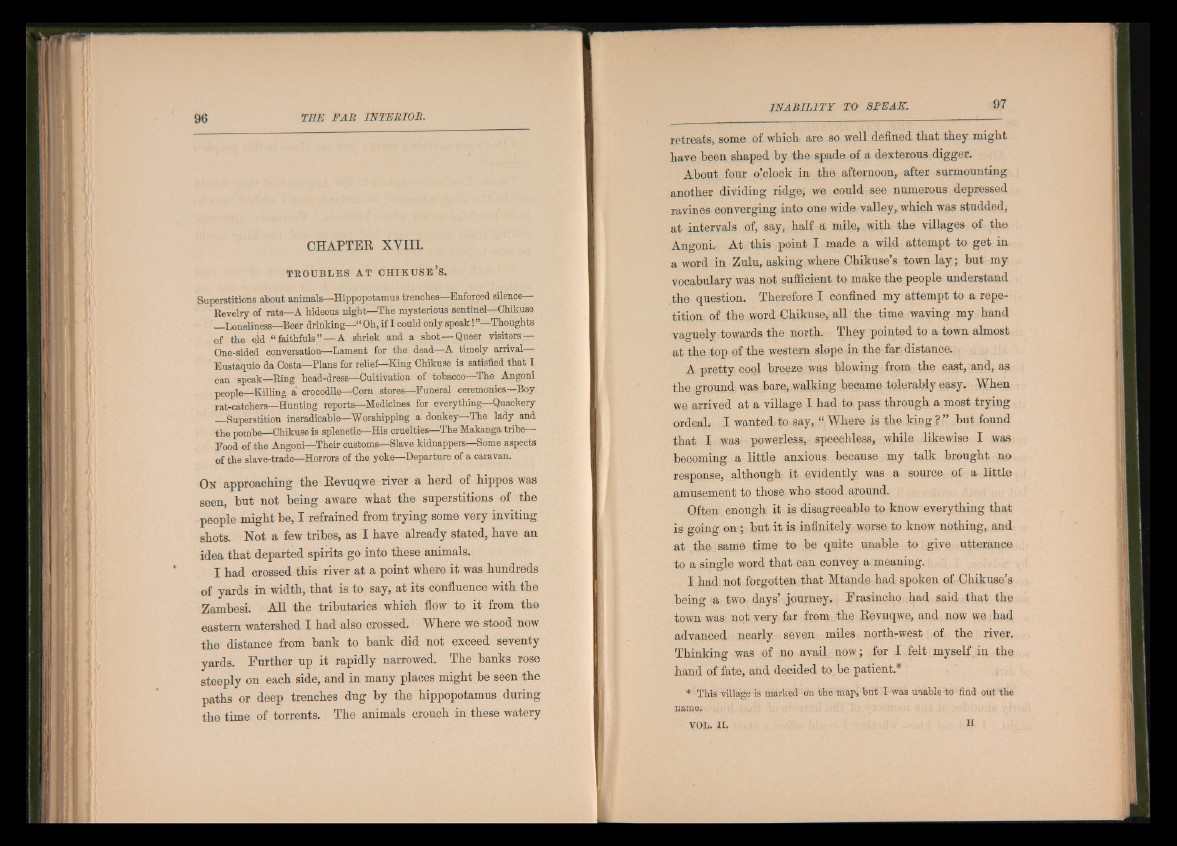
CHAPTER XVIII.
TROUBLES AT CHIKTJSE’S.
Superstitions about animals—Hippopotamus trenches—Enforced silence—
Revelry of rats—A hideous night—The mysterious sentinel—Chikuse
—Loneliness—Beer drinking—“ Oh, if I could only speak ¡’’—Thoughts
of the old “ faithfuls”—A shriek and a shot —Queer visitors —
One-sided conversation—Lament for the dead—A timely arrival
Eustaquio da Oosta—Plans for relief—King Chikuse is satisfied that I
can speak—Ring head-dress—Cultivation of tobacco—The Angoni
people—Killing a crocodile—Corn stores—Funeral ceremonies—Boy
rat-catchers—Hunting reports—Medicines for everything Quackery
Superstition ineradicable—Worshipping a donkey—The lady and
the pombe—Chikuse is splenetic—His cruelties—The Makanga tribe—
Food of the Angoni—Their customs—Slave kidnappers—Some aspects
of the slave-trade—Horrors of the yoke—Departure of a caravan.
On approaching the Revuqwe river a herd of hippos was
seen, hut not being aware what the superstitions of the
people might he, I refrained from trying some very inviting
shots. Not a few tribes, as I have already stated, have an
idea that departed spirits go into these animals.
I had crossed this river at a point where it was hundreds
of yards in width, that is to say, at its confluence with the
Zambesi. All the tributaries which flow to it from the
eastern watershed I had also crossed. Where we stood now
the distance from bank to bank did not exceed seventy
yards. Further up it rapidly narrowed. The banks rose
steeply on each side, and in many places might be seen the
paths or deep trenches dug by the hippopotamus during
the time of torrents. The animals crouch in these watery
retreats, soine of which are so well defined that they might
have been shaped by the spade of a dexterous digger.
About four o’clock in the afternoon, after surmounting
another dividing ridge, we could see numerous depressed
ravines converging into one wide valley, which was studded,
at intervals of, say, half a mile, with the villages of the
Angoni.. At this point I made a wild attempt to get in
a word in Zulu, asking where Chikuse’s town la y ; but my
vocabulary was not sufficient to make the people understand
the question. Therefore I confined my attempt to a repetition
of the word Chikuse, all the time waving my hand
vaguely towards the north. They pointed to a town almost
at the top of the western slope in the far distance.
A pretty cool breeze was blowing from the east, and, as
the ground was bare, walking became tolerably easy. When
we arrived at a village I had to pass through a most trying
ordeal. I wanted to say, “ Where is the king ? ” but found
that I was powerless, speechless, while likewise I was
becoming a little anxious because my talk brought no
response, although it evidently was a source of a little
amusement to those who stood around.
Often enough it is disagreeable to know everything that
is going on ; but it is infinitely worse to know nothing, and
at the same time to be quite unable to give; utterance
to a single word that can convey a meaning.
I had not forgotten that Mtande had spoken of Chikuse’s
being a two days’ journey, Frasincho had said that the
town was not very far from the Eevuqwe, and now we had
advanced nearly seven miles north-west of the river.
Thinking was of no avail now; for I felt myself in the
hand of fate, and decided to be patient.*
* This village is marked o‘n the map, but I was unable to find out the
name*
VOL. II. H